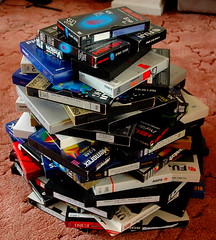 I've noticed a lot of time shifting trends lately, and by time shifting I mean people getting media earlier and later than usual. I know more than one person who's decided to get rid of cable TV, since if they wait they can get boxed sets of just their favorite episodes for less than paying for the hundred or so channels they never watched in the first place.
I've noticed a lot of time shifting trends lately, and by time shifting I mean people getting media earlier and later than usual. I know more than one person who's decided to get rid of cable TV, since if they wait they can get boxed sets of just their favorite episodes for less than paying for the hundred or so channels they never watched in the first place.(That won't be me, since my wife pays for the cable and she wants that next episode of Mythbusters as soon as it airs. To be honest, I can't say I blame her.)
I've also seen people who just can't wait. I could name a few individuals (You might know them already...) who downloaded bootleg copies of Star Wars Episode III before it came out in the theaters. They still went and saw it on the big screen, but it was worth it to them to see the low quality version first - like reading the last page of a good novel, I guess.
(I wouldn't know if it was worth it myself - I still haven't seen any copy Episode III, legal or otherwise. I liked Episodes IV, V, and VI much better than I and II, but I digress.)
A lot of technological innovations are allowing us to see things earlier or later, depending on the quality we desire. I think its rather neat, but unfortunately we don't see a lot of this in an educational environment.
I mean, sure, there are some teachers who podcast their lectures for posterity, or put their handouts online, but those educators are few and far between, and the know-how they need to get started can seem very daunting to them, even if it isn't to us.
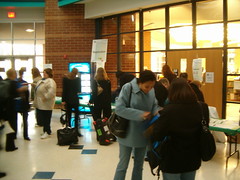 Case in point: A little more than a week ago I attended a very cool conference that was hosted by my employer. I had fun and got a lot out of it, but according to Technorati I seem to be the only person who even mentioned it in a blog. With several presenters, including myself and the Keynote Speaker talking about blogs, you would think at least one more person would have their own blog and mention it at least in passing.
Case in point: A little more than a week ago I attended a very cool conference that was hosted by my employer. I had fun and got a lot out of it, but according to Technorati I seem to be the only person who even mentioned it in a blog. With several presenters, including myself and the Keynote Speaker talking about blogs, you would think at least one more person would have their own blog and mention it at least in passing.OK this is getting depressing, so let's turn the floor over to you, shall we? I can tell from my stats that I have a decent amount of listeners, so here's what I'd like you to do. Go to my web site at AcademicAesthetic.com and find the show notes for episode 117. (It should be near the top, unless you're time shifting a lot.) I'd like everyone to add one of two types of comments:
- If you have a blog, podcast, or netcast, give it a plug. If nothing else, it'll encourage me to read it.
- If you don't have a blog, I'd like to know why. No time? No web host? Worried about legislation? Think you have nothing to say? I'm curious as to what hurdles you feel you'd have to overcome in order to become a blogger.
And if you want it to be an audio comment instead of a text comment, you can click on the link right below the image on the main page that says "Leave an Audio Comment!" or prerecord it and email it to me at TheArtGuy (at) gmail.com.


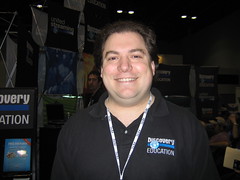

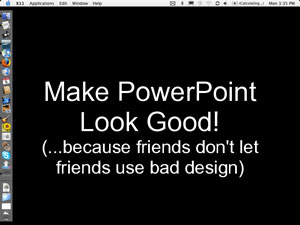 First of all, the term "PowerPoint" is a bit of a misnomer. We often use it to refer to any computer program that helps us give a presentation by throwing text and multimedia up on a large screen. It's sort of like how some New Jersey residents still call every brand of pork roll "Taylor Ham," and how some people refer to every cola as "Coke." Microsoft Office's PowerPoint is the most popular of these programs, but you could just as easily use OpenOffice, Apple's Keynote, or any one of a number of web based alternatives.
First of all, the term "PowerPoint" is a bit of a misnomer. We often use it to refer to any computer program that helps us give a presentation by throwing text and multimedia up on a large screen. It's sort of like how some New Jersey residents still call every brand of pork roll "Taylor Ham," and how some people refer to every cola as "Coke." Microsoft Office's PowerPoint is the most popular of these programs, but you could just as easily use OpenOffice, Apple's Keynote, or any one of a number of web based alternatives.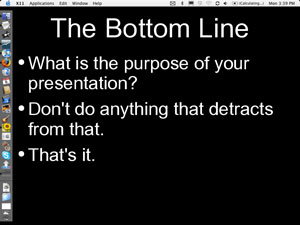 It sounds cliché, but less really is more in this case. I used to tell my students that they needed to assume their slide was a billboard alongside a highway. How much information could they put on that billboard without causing an accident? They could always add another slide if they wanted to include more information, after all.
It sounds cliché, but less really is more in this case. I used to tell my students that they needed to assume their slide was a billboard alongside a highway. How much information could they put on that billboard without causing an accident? They could always add another slide if they wanted to include more information, after all.